WACO — Waco will receive grants to strengthen the current teacher workforce and improve the pipeline of qualified teachers with the support of a $2.2 million grant over three years from the Bill & Melinda Gates Foundation.
The first initiative, University-School Partnerships for the Renewal of Educator Preparation, supports universities in the transformation of their program to financially sustainable, year-long residencies. Coalition member include Texas Tech University and Tarleton State University – both building and scaling a year-long residency that will produce well-prepared teachers in the Waco region in partnership with local school districts.
An Opportunity Culture grant will fund a creative staffing model that focuses on supporting sustainable residencies that are affordable for candidates at Waco and La Vega school districts. It also calls for creation of Greater Waco Teacher Community of Practice, a coalition of decision makers and stakeholders who will improve equity and quality for the teacher pipeline for all school districts in McLennan County.
Finally, the Center for Transforming Alternative Preparation Pathways (CTAPP), will provide support to McLennan Community College as it is innovating to improve its alternative teacher certification program.
“COVID-19 has put stress and demands on every school in Waco,” said Suzii Paynter March, CEO of Prosper Waco. “The strength and resiliency of the teaching profession is also under duress, and as a community we are using these opportunities to rally support for teachers of today and to recruit and grow strong teachers for tomorrow.
“The Greater Waco Teacher Community of Practice will be a forum of education leaders for discussion and innovation as we consider the entire teacher workforce landscape in our region,” March said.
The Opportunity Culture grant is designed to “leverage high-performing teachers in a multi-classroom leadership model,” Pereira said. In other words, it seeks to build on the excellence of the most effective teachers and will do that in conjunction with Texas Tech’s teacher residency program in Waco.
“One of the challenges that Waco ISD faces is a higher teacher turnover rate than many other districts,” said Susan Kincannon, Waco ISD superintendent. “We hope that the Opportunity Culture model will help retain our best teachers by offering them new opportunities to grow as educational leaders and better prepare the new teachers who will follow them in the classroom.”
“La Vega ISD is thrilled about the opportunity to participate in the Opportunity Culture grant,” said Sharon Shields, La Vega ISD superintendent. “The OC objectives support and expand on existing efforts in La Vega. The impact of OC in LVISD is unlimited. The potential and opportunity to replicate our most effective teachers will further improve our instructional programs leading to student success.”
US PREP, based in Lubbock, will work with the two universities – Texas Tech and Tarleton – in implementing sustainable, year-long residencies.
Public Impact, out of Chapel Hill, N.C., will work with the two school districts in implementing the Opportunity Culture program. The grant will fund a coordinator position at each district.
The second grant brings CTAPP to Waco. CTAPP, established in the Houston area, provides technical assistance to alternative teacher certification (ACP) programs, like the one already in existence at MCC.
“Most public school teachers in Texas pursue certification through the traditional route of earning a bachelor’s degree in teaching,” said Pereira. “But many people seek teacher certification after earning a degree in another academic area and working outside of education.
“This grant will bring specific expertise to Waco that enhances the alternative certification process for those who want to teach but do not have a teaching degree,” Pereira said.
Frank Graves, dean of workforce and public service at MCC, said: “McLennan Community College’s Alternative Teacher Education Program is excited about the partnership with CTAPP. The technical assistance and resources will enhance our program delivery and increase our teacher preparation mentoring process’s effectiveness.”
As part of the grant, CTAPP’s two employees became a part of the Prosper Waco staff in September — Chris Reid, director, and Mia O’Suji, director of content development and programming.
Reid and O’Suji have worked closely with Kristi Patton, MCC’s Alternative Teacher Program director, and her team to create a comprehensive plan, Graves said. “The result will be more highly trained teachers entering our local school districts.”
Reid noted that there is a teacher shortage in Texas and there also is a lack of quality teacher candidates. The state has created an environment for creation of ACPs to meet the training need. By partnering with ACPs, like the one at MCC, CTAPP provides “high-quality technical assistance to support the implementation of a rigorous, equitable teacher preparation model aimed at improving the quality of educators in classrooms.”
The Greater Waco Teacher Community of Practice is “designed to study the teacher pipeline in McLennan County with the intention of making improvements to the pipeline as a community,” Pereira said. “The pandemic has exposed areas of improvement in the field of education, and we are seeing that no one institution can do it alone. Together we must make the necessary improvements in order to have the teacher workforce needed for the future of our community.”
Several Waco churches are working to address specific needs of families associated with Transformation Waco schools. The churches are collecting goods and funds through Dec. 13 for the Christmas Family Resource Pantry.
Grassroots Community Development is coordinating the effort. Grassroots and Prosper Waco set up a Family Resource Pantry this past summer to help Transformation Waco school families suffering from the economic effects of the coronavirus.
“As we’ve begun to hear of specific needs of family from friends at Transformation Waco, we’ve decided to bring back the FRP to provide families with some of those needs over the Christmas break,” said Josh Caballero, a community organizer with Grassroots.
Transformation Waco is a nonprofit working within Waco Independent School District to manage and operate five schools and supporting the communities associated with those schools. The schools are Alta Vista Elementary, Brook Avenue Elementary, J.H. Hines Elementary, G.W. Carver Middle, and Indian Spring Middle.
For more information on the Christmas Family Resource Pantry contact Caballero at [email protected].
The following items are being collected:
- Toilet paper
- Shampoo
- Conditioner
- Bath soap
- Toothpaste
- Deodorant
- Bleach
- Dish soap
- Disposable masks
- Feminine products
- $25 gift card
(City council, school board, planning commission, county commissioners – these groups and several others represent us. They do the day to day work of running our community. It is our responsibility to keep informed about their work so that we can help them represent us effectively. “Civic Insights” by Jeffrey Vitarius is a regular feature of Act Locally Waco. Its purpose is to help us understand decisions that shape our community so that we can participate effectively as informed, engaged residents of Waco. – ALW)
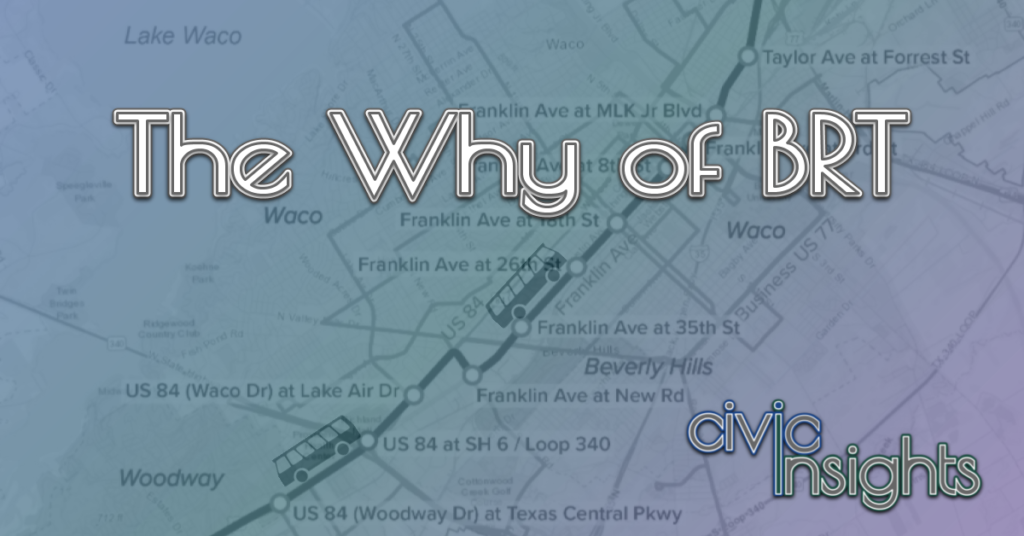
By Jeffrey Vitarius
We hope you all had a safe and enjoyable Thanksgiving and thought it might be good to start back up with a topic we find particularly interesting, bus rapid transit (BRT).
Next Thursday (December 10th, 2020) at 6:00 pm Waco Transit, the Waco Metropolitan Planning Organization (MPO), and AECOM Technical Services are hosting a virtual meeting to gather public input on station locations and designs for the BRT project. AECOM also recently provided updates to the City Council and MPO on the progress of the project. Let’s take a look at why this project is being considered and what stage of the process we are in now.
Way back in 2013-4, the City of Waco commissioned an Economic Development Strategic Plan from the W.E. Upjohn Institute for Employment Research. The study is generally called the Upjohn Report. Unlike a standard economic development strategy that focuses purely on the “general economic performance of the area,” the City “called for a plan to also reduce poverty, increase labor force participation, and increase area income.” That is, rather than focus on economic growth in and of itself, the plan also focused on how that growth might be made equitable for the people of Waco. This focus on equitable development rather than just any development remains an important goal of the City.
In the process of drafting their report, the Upjohn team interviewed ninety individuals, asking them (in part) about what challenges they see to finding and retaining employment. The result, “transportation was overwhelmingly cited as the most prominent barrier to finding and keeping a job.” In 2018, about 8% of Wacoans got to work by a means other than a car. At that time approximately 29% of Wacoan households had no car or 1 car. The average household size in Waco is about 2.5 people meaning that having one car could mean a household is still reliant on a non-car means of getting to work.
Although walking or cycling remain valuable commuting options for folks (your author does so whenever he can), needing to rely on your feet or your bike makes you vulnerable to long distances and poor weather (especially August heat). Given these challenges, it is critical for those in Waco who do not have ready access to a car that public transit gets people where they need to go reliably and as swiftly as possible.
The current Waco transit system is configured as a “spoke and hub.” In this design bus routes extend out from the City core to residential neighborhoods, job centers, and service locations before returning Downtown. The routes out and back are the “spokes” with the Downtown Transit Center as the “hub.” The transit map below shows how the various routes converge at the transit center downtown before spanning out across the city.
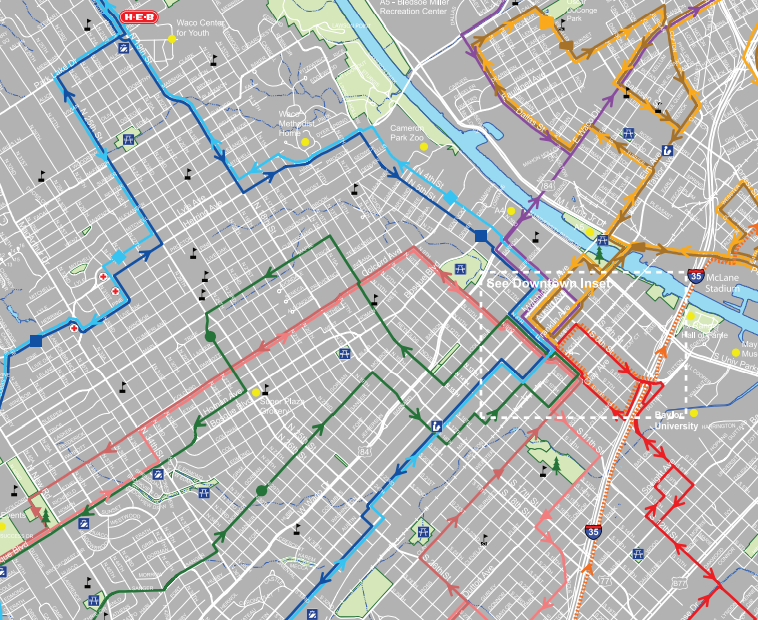
(Map 1)
This configuration has its challenges. The spoke and hub setup means that to get from one side of town to the other, an individual has to transfer at the “hub,” lengthening travel times. Additionally, the variety of routes mean that each route can only be run once an hour (in the case of East Waco the route runs varying directions based on what hour of the day it is).
BRT may be the solution to these issues. The BRT would run through the middle of the city extending from Woodway through Downtown Waco and on to Belmead and Lacy Lakeview. The BRT would make fewer stops and be timed to traffic. This would, theoretically, reduce the delays caused by passengers entering and exiting the bus as well as the delays caused by sitting in traffic. The goal of such a system would be to maximize the time the bus is in motion, therefore reducing travel times. It is also hoped that such a system would generate more frequent bus service and bus services that extend more into weekends and evenings (an important factor when considering whether folks can get to work when they need to).
In 2018, the City received a feasibility study from AECOM Technical Services that looked at the potential system overall as well as a number of route, technology, and service operation options. The study recommended (after substantial public input) a route that ran from US 84 to New Road to Franklin Avenue to Taylor Street and Hillsboro Drive before taking US 84 to Loop 340. On May 1, 2018 the City Council approved the recommended route. Below is the most recent map of the proposed route.
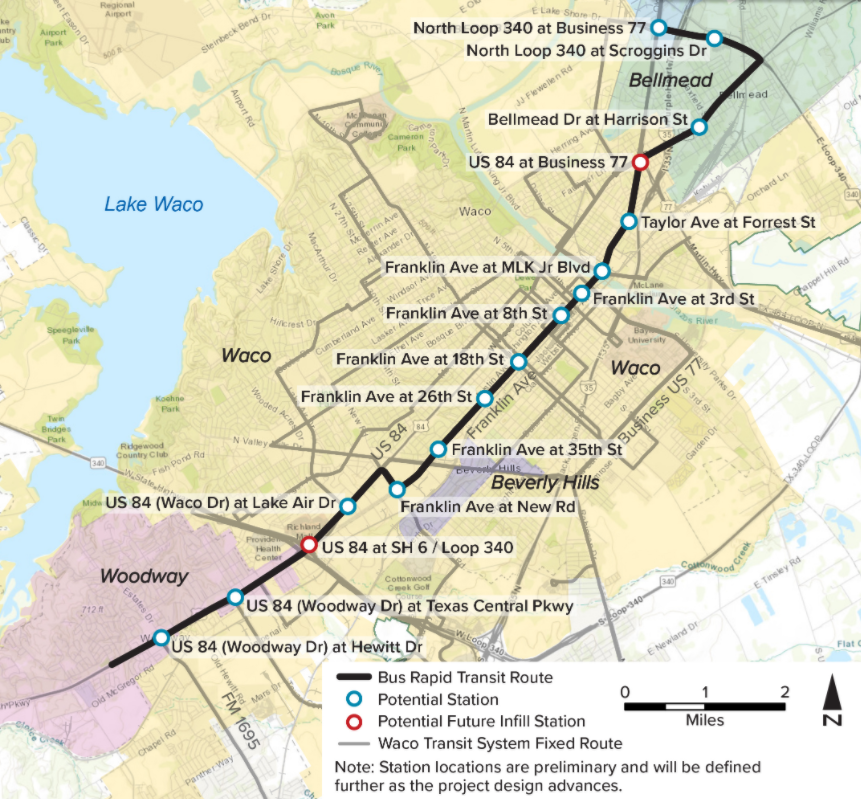
Since then, the City, the MPO, and AECOM have begun the process of seeking federal funding for the project. In July of 2019, pre-award authority was granted that allows the City to begin pursuing projected development costs before receiving a formal award. Under this authorization the City sought services for preliminary engineering and environmental review. We are in the middle of that process now.
Preliminary engineering (think of this as preliminary technical design) needs to be completed to understand the final costs of the project and pursue the funding needed to cover those costs. Environmental review is required to make sure the project will not unduly damage Waco’s environment. Throughout this part of the process there are three different periods of public input planned. The first passed in October, when AECOM sought to reintroduce the project to Wacoans and update them on the project approach. The second is the meeting coming up on December 10. This one will focus on where stations will be and how they will function. Both of these aspects can have a huge impact on cost and operations down the line. Finally, in mid-February it is anticipated that the final results for this phase of the project will be brought before the public for review.
Other Interesting Items from the Agenda (to me)
- Over the last two meetings City Council has received information regarding a Municipal Settings Designation (MSD). In short, this would reduce a hurdle to development in the city’s core by prohibiting the future use of groundwater as potable (safe to drink). Without a Municipal Settings Designation each property owner would have to deal with testing and remediating groundwater contamination before development which can slow projects in an area where the city provides water to all properties anyhow.
- The City and WISD are working on a partnership to provide all WISD students with e-cards that would grant them access to the library’s substantial e-book catalogue.
- The J.H. Hines Elementary Sidewalks project continues with the city pursuing $101,918.37 in property acquisitions to account for right of way needs.
Meeting Basics
- City Council meets on the first and third Tuesday of every month. Work session – 3:00 pm / Business session – 6:00pm (there have been two meetings since our last post)
- To watch the recorded session click here (City of Waco Cable Channel, wccc.tv)
- For the full agenda click here (11/17) or here (12/01)
- For the meeting packet with the documents pertinent to the meeting click here (11/17) or here (12/01)

Jeffrey Vitarius has been actively local since early 2017. He lives in Sanger Heights with partner (JD) and his son (Callahan). He helped found Waco Pride Network and spearheaded its Vision 2025 process. Jeffrey works at City Center Waco where he helps keep Downtown Waco clean, safe, and vibrant. He is a member of St. Alban’s Episcopal Church and graduated from Baylor in 2011.
The Act Locally Waco blog publishes posts with a connection to these aspirations for Waco. If you are interested in writing for the Act Locally Waco Blog, please email [email protected]for more information.
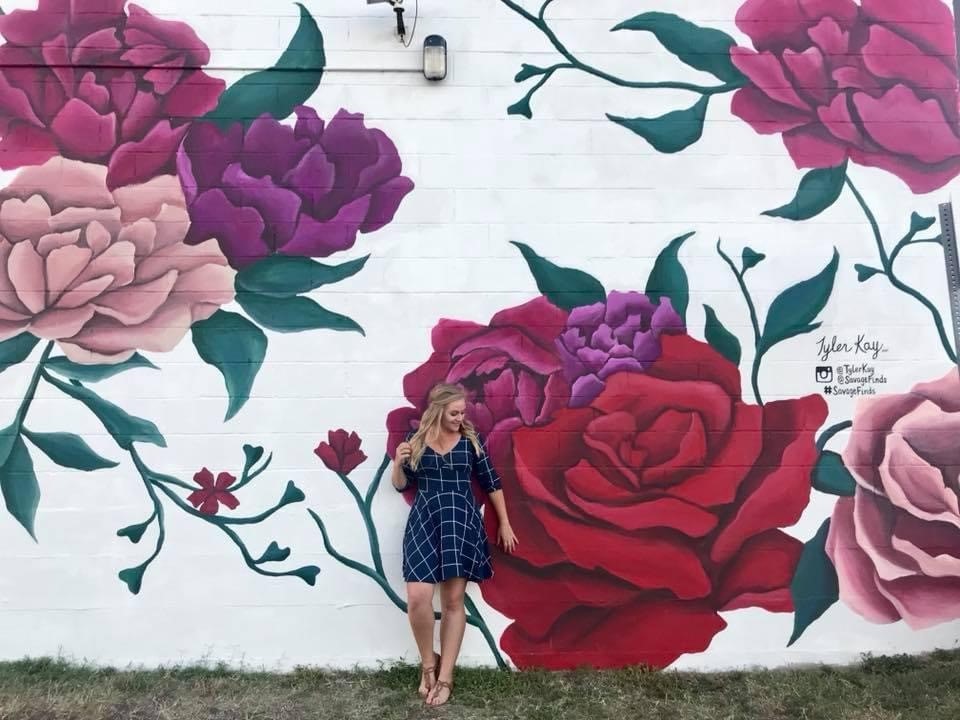
By Debbie Wright
Tyler Kay is Texan, raised right outside of Houston on her family property in Katy. She is the type of person who sees a freshly painted white wall and immediately thinks ‘I really want to paint that’. That is exactly what happened back in 2017 when she was visiting Waco with her family. She walked right in the building with her dog by her side and spoke with the owners of Savage Finds, Joey & Tammy. They agreed to let her do it! Joey, actually thought of the phrase, “My greatest find…” so the mural is a mix of her style of florals and his clever wit. Now the beautiful mural has become one of the “greatest finds” in downtown Waco.
Coincidentally, the interview for this article took place on the 3-year anniversary of the mural, which was completed on October 15, 2017. She said this mural really “got the ball rolling” for her and gave her more opportunities for murals. Now, painting murals is both her hobby and day Job, and she wouldn’t have it any other way. “Murals are my everything, I only do murals and art now, so it is pretty much my life,” she said. As evidence to back up her statement, her were smudged with bright colored paint here and there and even her cell phone had colorful droplets scattered across it.
Her inspiration for becoming an artist came from a big turning point in her life. Her boyfriend died in a car accident and this caused her to reevaluate her life. “I am wanting to leave something behind for me to be remembered by and make a difference,” she said. She calls this “Mortality Motivation” and it has helped her turn dark moments in her life into light. She sometimes creates art works titled with important or pivotal dates from her life. The numerical values in her “Glitch & Glam” painting series are based on the dates of occurrences in her life that she acknowledges as instances of redirection towards her bigger purpose. Glitch 12.20 represents December 20th, the date of her boyfriend’s accident.
This surprisingly has become one of her most successful and favorite pieces. She has showed her works across the country and her paintings have been featured in renowned art exhibitions, music festivals, and publications. While on exhibition at Art Basel Miami, that piece sold to a private collector in only two days. “Glitch & Glam” is one of her favorite series and she said she hopes to expand and continue it in the future.
Tyler specializes in florals and enjoys incorporating meaningful quotes into her compositions. Many of her works focus on positivity and growth. “I am loving how much my works can be interpreted and people can bring so many different meanings to it (the murals),” she said. She loves seeing people interact with her pieces and finds herself smiling and happy crying over all the pictures people share with her murals of engagement pictures, weddings, and even maternity pictures. “Public art is what I love because people can interpret it in so many ways,” she said lovingly.
After her schooling at the University of Houston, where she obtained a Bachelors of Art and a Masters in Arts Leadership. She got a job at Bisong Art Gallery, also in Houston. She worked her way up from mopping floors to being a gallery director. That position opened doors and gave her many new experiences. One of her earliest murals was for a dance studio, from there it was just one after the other until now she does it for a living.
Though she loves what she does, she also loves to travel and see the world. “I would just pack up and go to Europe for a month… That may seem like a long time but since I never really have time off and work every Saturday and Sunday it works as a great break,” she said while talking about her love of travel and culture.
If you are interested in finding out more about Tyler Kay or are interested in purchasing some of her art, follow her on Instagram at https://www.instagram.com/tylerkay/ or her other social medias and buy her prints at https://tyler-kay.com/ .

Debbie Wright runs the local Know Waco Podcast, which features upcoming events and activities happening in and around the Waco area. She is a recent Texas Tech graduate, with a major in communications and minor in public relations. She has lived in the Waco area for ten years and loves to work with local creatives and artists.
The Act Locally Waco blog publishes posts with a connection to these aspirations for Waco. If you are interested in writing for the Act Locally Waco Blog, please email [email protected]for more information.
By Dr. Peaches Henry
As predicted by infectious disease experts in the summer, coronavirus infections are now surging across the nation during the winter and holiday period. COVID-19 hospitalizations in McLennan County hit a record on Monday, November 24, and local health officials said that warnings about Thanksgiving gatherings must be taken seriously. If not, the McLennan County’s medical capacity could be strained in the weeks afterwards. The scientists of the Centers for Disease Control and Prevention are pleading with Americans to avoid traveling for Thanksgiving and to celebrate only with members of our immediate households. Put starkly, spend Thanksgiving with family; spend Christmas in the ICU.
Facing these dire consequences, many of us have decided to forego our traditional holiday celebrations to try to stem the spread of the coronavirus. My own family, stretched across several Texas cities and involved in various conditions of employment including completely working from home, working hybridly, and working face-to-face all dealing with students, has decided to forego a face-to-face Thanksgiving this year.
Though I am disappointed not to be with my family, I wanted to reach out to others to offer some ways that we are trying to get through this time. Let’s face it. We might have to spend Christmas separated as well. We might as well prepare for the entire holiday season—Christmas, Hanukkah, Kwanzaa, all of them. These are safe activities that are good for our emotional and mental health that abide by the recommendations of the CDC and local doctors.
Be grateful.
- If you are reading this blog, be thankful. Though 2020 has been unprecedented in so many ways, we still have much to be thankful for. Count your blessings. Since it is 2020, count up to twenty blessings. Go ahead and count twenty more, because it’s 2020.
Reach out to others.
Though apart, we are in this season together. Some people suffer from depression during this season even when we are not in a worldwide pandemic, so you can imagine how down they are feeling now. We know that giving to others helps build resilience and diminishes some of the isolation many are suffering. Therefore, it is important to be purposeful about reaching out to people and making them feel part of the community.
- How about that new neighbor who just moved in? Write a note of welcome with your phone number for emergencies. Or that family whose children have been learning remotely for weeks? Leave a puzzle or a card game on the front porch.
- Give poinsettias to several of your neighbors.
- Deliver a meal to someone you know will be alone for the holidays. Bake cookies and let your children deliver them to neighbors (remember, contact free!). This is one of the CDC recommended substitute activities.
Find new ways to observe your family’s traditions.
- One of the activities I miss most is cooking and chatting with family the night before the big day, especially with my mom (now gone to heaven) “suggesting” that I add more of this or that ingredient. This year I’m cooking and chatting with my sister via Zoom.
- Among my family’s time-honored traditions is playing board games. From Connect Four to Monopoly to Bible Trivial Pursuit to Trouble to Uno to Jenga to Sorry to Scrabble, we play them all. To say that we play games is a milquetoast description of what my family has done over the years. We play ferocious, competitive, winner-take-all games. We game out which games we are going to play weeks ahead. We pick our teams with winning in mind—my late mom, the Sunday School superintendent, for Bible Trivial Pursuit; my son, the strategizing law student, for Monopoly; my brother, the sports fanatic and movie enthusiast, for Trivial Pursuit; and me, the English professor, for Scrabble. Good sportsmanship is a must: winners and losers must shake hands and smile at the end of the game. My sister and I still crack up remembering the grimaces that passed for smiles when we were children. Then we gloat all year till the next holiday (really for years). The family still gives me grief for not remembering Robert Ludlum as the author of the Bourne Identity which would have won the game for the girls in 2006! Argh! So how will my family replace this tradition when we will not be together? We are still going to play games. We are going to harness the power of technology—Zoom, Facetime, Google Hangouts, etc. One game we are going to play is the #Hashtag. This will advantage millennials and GenXers, but I plan to get one on my team. Whatever your family’s tradition is, find a new way to celebrate it.
- Enjoy watching the Macy’s Thanksgiving Day Parade while you prepare dinner? The full 2019 Macy’s Thanksgiving Day Parade is on YouTube.
- Watch your favorite holiday specials together on Zoom. “A Charlie Brown Christmas” will air free on PBS on December 13. One, two, three, click!
- Put “the game” on at everyone’s house and watch it “together.”
- Sing Christmas carols together via Zoom.
Bring back old traditions.
- A Christmas card arriving via the USPS in a mailbox would lift the spirits of someone who is spending the holiday alone and away from family. Writing the cards together as a family over cookies and milk or tea could create some great family moments. The benefits of a paper card is that it can be hung up in a barracks, stuck to a refrigerator, or placed on a desk.
Create new traditions.
- Plug your charger into your phones and have a conversation with a group of friends or family members. This can easily be done via Zoom, but if folks are tired of Zoom, everyone can kick back on couches and chat. We play a conversation game called “Favorite” at dinner parties that is easily transferable to a phone conversation. It works for all ages and leads to great conversations and reveals surprising tidbits about players. Sample topics: What is your favorite childhood television show? Dark Shadows, anyone? What is your favorite book? Favorite mystery? Favorite car? Favorite animal?
- Have a drive-by parade for sick-n-shut-ins at your church.
Put on your favorite soundtrack.
- A good soundtrack can make any situation bearable. Put yours on and dance the night away. Take your pick of music streaming platforms: Pandora, Spotify, Apple Music.
- Go a step further and dance. Use YouTube videos to learn the steps to line dances. The Electric Slide (old school favorite), the Wobble, the Cupid Shuffle, the Cotton Eyed Joe. Dancing is a much more enjoyable way of getting those endorphins going than running.
Breathe, relax, release.
- Embrace the fact that you don’t have to cook a twelve-course meal for twenty family members plus that family of six who will show up without notice.
- Be happy that Uncle Blank won’t be at the table to ask uncomfortable questions. Do give him a call though.
- Go to bed early the night before Thanksgiving Day. Better, get up late on Thanksgiving Day.
- Put your holiday decorations up early. My neighbors seem to already have decided to do this. Lights lift the spirits. My family usually waits till Christmas Eve to go see the lights. This year, I’m going early.
Bonus: Have hope and faith!
- Know that we will get through this time. History is our witness. The world got through the 1918 flu pandemic. We will get through the 2020 COVID-19 pandemic.

Peaches Henry is the president of the Waco NAACP and an English professor at McLennan Community College. She will be spending Thanksgiving with her best friend and black Lab Samson and Christmas with her son Corey and Samson.
The Act Locally Waco blog publishes posts with a connection to these aspirations for Waco. If you are interested in writing for the Act Locally Waco Blog, please email [email protected]for more information.
There’s no better way to spread holiday cheer than volunteering in your local community! Volunteering and donating are a great way to get into the spirit of giving. Read on for some ways you can give back to the Waco community this holiday season.
The Salvation Army Waco
The Salvation Army is famous for its ubiquitous red kettles and bell ringers outside of stores during the holiday season, and this year is no different, despite the challenges of COVID-19. The Red Kettle Campaign is the one of the Salvation Army’s biggest fundraising events of the year, and the money collected in the kettles goes directly to programs and services that help people right here in McLennan County. The Salvation Army needs bell ringers until December 24. To pick a date, time, and location to ring, visit www.RegisterToRing.com. To ensure the safety of bell ringers and donors, masks will be required at the kettles and touchless payment options like Apple Pay and Google Pay will be available.
If you’d rather stay at home, you can take the Virtual Red Kettle Challenge right from your couch! Set up your own kettle online, and you’ll receive a personalized link to share with friends and family so they can “fill” your kettle. Take the Red Kettle Challenge here.
Volunteers are also needed at the Salvation Army Community Kitchen now through January to serve meals, including the traditional holiday meal on Christmas Day. To help out at the community kitchen, sign up at http://sarmytx.org/volunteerwaco or call 254-756-7271.
The Salvation Army Waco is also hosting the Rescue Christmas Run this year. Sign up for the run at here and run (or walk or bike) for good!
You can also help out by shopping the Salvation Army Toy Registry and making Christmas special for Waco children in need. Take a look at the registry here, then ship or bring toys to The Salvation Army, 4721 W. Waco Dr, Waco, TX 76710.
Lastly, you can donate money directly to the Salvation Army Waco by visiting www.salvationarmywaco.org.
Shepherd’s Heart Food Pantry
Help make Christmas a truly joyful holiday for all Waco kids! Shepherd’s Heart Food Pantry is hosting their annual “Toys from the Heart” toy drive and need donations to help provide for families in Waco. They need toys of all kinds for kids in grades K-12. For more information, click here or call 254-213-7833. For a list of drop off locations, click here.
Family Abuse Center
Make the holidays bright for survivors of domestic violence and their children! Family Abuse Center is working to make this holiday season feel special and comforting to survivors with their “Holiday Helpless Gift List.” They need toys for children and household and personal items for adults. A full list of needed items can be found here. Bring unwrapped items to Family Abuse Center now through December 18. For more information about donating and dropping off, call 254-772-8999.

Becca Muncy is an Act Locally intern from Dallas. She is studying professional writing at Baylor University and is completing her senior year.
The Act Locally Waco blog publishes posts with a connection to these aspirations for Waco. If you are interested in writing for the Act Locally Waco Blog, please email [email protected]for more information.
Happy Thanksgiving, Waco! A few weeks ago, I put out a call in The Whole Enchilada, asking for people’s favorite Thanksgiving recipes. I wanted to create a blog post that could serve as a community cookbook for Waco. And, boy, did you deliver some fantastic recipes! Read on for three great recipes from your Waco neighbors: a show stopping side, a fun and easy dessert, and a unique twist on Thanksgiving leftovers! Then, click here for a special Act Locally Thanksgiving recipe card you can print off and use to keep these recipes for years to come!
The Recipe: Hasselback Butternut Squash (Adapted from Bon Appetit Magazine)
This recipe was submitted by Rachel, who has lived in Waco on and off for the past 10 years, and whose favorite Waco spot is Lula Jane’s porch! Rachel made this recipe while celebrating Thanksgiving in the UK and added the serrano pepper and sorghum syrup for a little Southern flair once she returned to Waco.
Ingredients:
1 large butternut squash
1 tablespoon olive oil
Kosher salt
Freshly ground black pepper
1 serrano chile, thinly sliced
¼ cup pure sorghum syrup
3 tablespoons unsalted butter
2 tablespoons apple cider vinegar
6–8 dried bay leaves
Directions:
Place a rack in the upper third of oven; preheat oven to 425°F. Halve squash lengthwise and scoop out seeds with a large spoon. Using a peeler, remove skin and white flesh below (you should reach the deep orange flesh). Rub all over with oil; season with salt and pepper. Roast in a baking dish just large enough to hold halves side by side until beginning to soften (a paring knife should easily slip in only about ¼”), 15–18 minutes.
Meanwhile, bring chile, sorghum syrup, butter, and vinegar to a simmer in a small saucepan over medium-high, stirring occasionally and removing chile as soon as desired heat level is reached (set aside for serving), until just thick enough to coat spoon, 6–8 minutes. Reduce heat to very low and keep glaze warm.
Transfer squash to a cutting board and let cool slightly. Using a sharp knife, score rounded sides of squash halves crosswise, going as deep as possible but without cutting all the way through. Return squash to baking dish, scored sides up, and tuck bay leaves between a few of the slices; season with salt and pepper.
Roast squash, basting with glaze every 10 minutes or so and using pastry brush to lift off any glaze in the dish that is browning too much, until tender and glaze forms a rich brown coating, 45–60 minutes. Serve topped with reserved chiles.
The Recipe: Cinnamon Walnut Pecan Pie Bites (From the Texas A&M AgriLife Extension Service)
This recipe was submitted by Lindsey, who has lived in Waco for 5 years and loves walks along the Brazos River! This recipe can be easily doubled, tripled, or even halved, depending on how big or small your Thanksgiving crowd is!
Ingredients:
15 mini phyllo shells, frozen
1/4 cup liquid egg substitute
3 tablespoon dark brown sugar
1/2 tablespoon room temperature butter
1/8 teaspoon cinnamon
1 drop vanilla extract
1/8 teaspoon salt
2 tablespoon chopped walnuts
2 tablespoon chopped pecans
Directions:
Preheat oven to 375°F. Spray a baking sheet with nonstick spray or line with parchment paper.
In a medium bowl, combine egg substitute, brown sugar, butter, vanilla extract, cinnamon and salt. Mix well.
Stir in 1 tablespoon chopped pecans and 1 tablespoon chopped walnuts into mixture. Arrange phyllo shells on baking sheet and distribute the mixture evenly among the shells. Combine remaining nuts and sprinkle them on the top of the shells.
Bake in the oven until edges are crisp, 15-18 minutes. Allow to cool slightly before serving. If you like, top each piece with a squirt of fat free whipped cream topping. Enjoy!
The Recipe: Thanksgiving Leftovers Lasagna
This recipe was submitted by an anonymous Act Locally reader, who has lived in Waco for 49 years and whose favorite Waco spots include Cameron Park and the River Walk at the Waco Suspension Bridge! This recipe is a great way to use up leftovers; feel free to swap any ingredients based on whatever leftovers are in your fridge!
Ingredients:
3 cups leftover cornbread stuffing
1 (14-oz.) can whole berry cranberry sauce
1 ¼ lbs cooked turkey breast, sliced into ¼ inch slices
3 cups cooked mashed potatoes
2 cups green beans, corn, or mixed vegetables
6 oz sharp white Cheddar cheese, shredded (about 1 ½ cups)
Gravy, for serving
Directions:
Preheat oven to 400°F. Lightly grease a square baking dish with cooking spray.
Spread half of the stuffing in a layer in bottom of prepared baking dish. Spread half of the cranberry sauce in an even layer over stuffing. Layer half of turkey slices on top of cranberry sauce, then half of vegetable of choice, then spread half of the mashed potatoes on top of vegetables. Sprinkle half of the shredded cheese on top of potatoes. Repeat layers once. Bake in preheated oven until lasagna is warmed through, about 20 minutes. Increase heat to broil, and broil until cheese is golden, about 2 minutes.
Remove from oven and let stand 5 minutes before cutting into squares. Spoon gravy over each square to serve.

Becca Muncy is an Act Locally intern from Dallas. She is studying professional writing at Baylor University and is completing her senior year.
The Act Locally Waco blog publishes posts with a connection to these aspirations for Waco. If you are interested in writing for the Act Locally Waco Blog, please email [email protected]for more information.

By Robert J. Rush, Sr.

My brother, Frank, recently sent me a link to an article about a history making event at the navy. The article is entitled “A Military 1st: A Supercarrier Is Named After An African American Sailor.” He correctly thought I would particularly be interested as a retired sailor. He was more than correct.
The article goes on to explain that the event was particularly amazing because super carriers are normally named after U. S. presidents, not enlisted sailors, and especially not enlisted ‘Black’ sailors. Well, you should be proud to know that according to the article, a supercarrier now on the drawing boards will be christened the USS Doris Miller, after our own Doris Miller from Waco, Texas. That is an awesome honor.
After reading the article, I thanked Frank and decided to expound on the story some, providing a brief historical update on Blacks in the navy since the days of the heroic actions of Doris Miller. I would like to share that with you.
As covered in the article, the heroic actions of Doris Miller in the heat of battle demonstrated to many that Blacks could do more in service to our country that just be messmen or stewards, who took care of naval officers by laying out their clothes, shining their shoes and serving their meals. That’s almost all we were allowed to do at the time in 1941. Even touching the guns and firing them as Doris Miller did was against the regulations at that time. However, his actions caused many senior military and non-military leaders to rethink how Blacks were being used in the navy. The impact of what he had done started the navy to training Black sailors for other rates/jobs such as gunner’s mate, radioman and radar operator. It even started them to think about the idea of having a Black naval officer.
Projecting the story a little forward in history, the navy decided to give the idea of making Black officers a try. First the navy experimented in 1944 by selecting 16 enlisted Blacks to be secluded and trained to become naval officers. This ultimately led to the “Golden 13,” the first group of Black naval officers (12 commissioned officers and 1 Warrant Officer). Seems the navy just arbitrarily chose 13 of the 16 though all of them excelled and passed all of the tests. One claim was that by doing so, it kept the commissioning percentage in line with the other commissioning sources.
Later, in 1945, the esteemed Naval Academy admitted six Blacks into its halls as midshipmen, including Wesley Brown. The five men who came before Brown as Midshipmen were chased out of the academy altogether. (No reason was given in the source articles). So, Brown was the first to make it to graduation/commissioning in 1949. From there he forged a successful 25-year naval career, retiring as a Lieutenant Commander (O-4).
Fast forward again and the navy tried another experiment. They experimented with commissioning Black officers into the navy through a traditional Historically Black College or University (HBCU). They tried this in 1968, choosing Prairie View A&M as that HBCU, out of three HBCUs that were being considered. That’s how PV got it’s NROTC unit, of which I (from Waco, TX) became an original member in 1968, my freshman year there.
To complete the unit, in addition to our freshman class, they allowed some upper-class army ROTC students to switch over to the NROTC. The first class of the PV NROTC graduated and received their commission in 1970. There were 13 of them. They chose to revive the moniker, the Golden 13. That class set records for performance during their time in service, yielding 6 or 7 O-6 and above officers (i.e., naval Captains and Admirals) out of that class. This was and remains today to be an unprecedented percentage for the whole navy’s commissioning sources, including the Naval Academy.
My class graduated in 1972 as the first, full 4-year class from the historic unit. After 20 years of active service, I retired in 1992 as a Lieutenant Commander (O-4). We all celebrated the unit’s history back in 2018 at the 50th Anniversary ceremony of the PV NROTC unit. Johnitha and Rashaad supported me by attending the event with me. They got the opportunity to see and hear about the proud history of our unit. They also got to meet my best friend from my active days in the navy, CWO4 Dean Johnson, who has since gone to be with our Lord and Maker. As an aside, some others of you may remember meeting Dean. He and his wife Karen came to Waco to support me at Mary’s funeral.
How about that for fitting the Doris Miller story into an even larger story with even more personal and Waco relevance? Coincidental to us, especially considering I never planned to have anything to do with the military. Not coincidental to God, who has blessed me all along the way and continues to do so each and every day.

This article was originally published in the October 2020 issue of The Anchor News. The Anchor News is a free, monthly publication of Crawford Publishing. The Anchor News is dedicated to serving the community and surrounding area, focusing on positive news and accomplishments of minorities. For more information about The Anchor News including how to subscribe or where to pick up a copy, please visit The Anchor News website.
By Olivia Evans
McLennan Community College has a long-standing focus on providing quality education to under-served populations in Central Texas. The College will continue those efforts with the help of a $3 million Title V grant from the Hispanic-Serving Institution (HSI) Program of the U.S. Department of Education. The grant will fund a project entitled First Year Focus: Developing Academic and Co-Curricular Student Support Structures to Improve First Year Outcomes. The College will receive about $600,000 annually over a five-year period.
With this project, McLennan will work to increase course completion, graduation, and transfer rates of Hispanic, low-income, and first-time-in-college students. The primary goal is “to build innovative support structures to create enriching academic opportunities that foster student success.”
“When students drop out or stop out, most of the time it’s not because they can’t do the work. It’s because life gets in the way. Providing more support will help them overcome the barriers that derail their progress,” says Paula Unger, McLennan sociology professor and grant project director.
To serve McLennan’s Hispanic and other underserved students, the program will implement a three-pronged approach to supporting first-year students: student engagement, supplemental instruction, and revamping the freshman orientation course, Learning Framework. This restructuring will focus on academic support services, peer leadership, career planning, financial literacy, and cultural competency.
“Our Title V efforts are about equity and meeting students where they are,” says Unger.
The First-Year Focus Team is confident that these newly-implemented programs and resources will be beneficial not only to Hispanic students in achieving academic success, but to all first year and returning McLennan students as well.
“As a College, we can’t progress if those who need a little extra help are ignored or left behind. Our community needs everyone’s gifts,” says Unger.

Olivia Evans is an intern in McLennan Community College’s Marketing and Communications office. She is a senior at Baylor University studying Public Relations and Corporate Communications. Olivia is a Houston, Texas native and plans to work in sports and entertainment digital marketing.
(City council, school board, planning commission, county commissioners – these groups and several others represent us. They do the day to day work of running our community. It is our responsibility to keep informed about their work so that we can help them represent us effectively. “Civic Insights” by Jeffrey Vitarius is a regular feature of Act Locally Waco. Its purpose is to help us understand decisions that shape our community so that we can participate effectively as informed, engaged residents of Waco. – ALW)

By Jeffrey Vitarius
On Tuesday November 10, 2020, the Budget & Audit committee of the City Council met. Their only discussion item was a review of the proposed Capital Improvements Program (CIP) and the associated debt impacts. Let’s breakdown what all this means and how it relates to the street in front of your house.
What is the Budget & Audit committee of the City Council?
This is the group of City Council members charged with taking a closer look at the city’s budget and audit functions.
So, is the Capital Improvements Program (CIP) a kind of budget?
Well, it is similar to one. Broadly speaking the city “budget” can be thought of as broken down into two parts, the operating budget and the CIP. The operating budget covers the services the city provides as well as its day-to-day work (we touched on an interesting summary of these services last week).The CIP covers large-scale projects. As this year’s budget explains “The CIP includes those items typically thought of as ‘infrastructure’ – streets, water and wastewater lines” (hmmm…streets, water, and wastewater sound familiar).
Since the CIP involves projects that span over multiple years, involve large dollar amounts, and often have a variety of funding sources (including debt) they are dealt with through a process separate from the operating budget.
Why is the CIP being dealt with now? Wasn’t the budget process in September?
In previous years, the CIP was developed at the same time as the operating budget (prior to September). This year, however, there was a change. The CIP process was moved to the winter after the budget process was concluded.
There were a number of reasons for the change, but two stand out. First, moving the CIP to its own time of the year allows staff and the City Council to focus on it alone in the winter rather than trying to split focus between developing the CIP and the operating budget. Second, moving the CIP to winter means that staff can work with certified property values.
As you may remember back when the Operating budget was adopted, the McLennan County Appraisal District was only able to issue a certified estimate of property values in Waco. At the time almost $1.8 billion dollars of value was still being protested (meaning it was still unclear exactly what those properties would be valued at and how much property tax revenue they would generate). The potential changes from the protest process make it difficult to build any kind of budget, but they are particularly problematic when you have to project a budget out for the multiple years required for CIP development.
So what does the CIP tell us?
In the broadest sense the CIP is a list of all the “infrastructure” projects the city plans to tackle during the year along with how it plans to pay for them.
What has happened so far in the process?
Back at its September 8th meeting the Budget and Audit Committee discussed the timeline change noted above. In October they held a preliminary discussion with staff regarding priorities. This week they reviewed the CIP drafted by staff in response to the discussion in October.
What is in this year’s proposed CIP?
Details of the proposed CIP can be found in the meeting packet for this week’s Budget and Audit Committee meeting. From a high level this CIP proposes $112,879,149 of capital spending in fiscal year 2021. $31,635,519 is planned for streets (see map below), $1,050,000 for park development, $6,150,000 for solid waste, $7,595,000 for airport improvements (mostly funded by CARES act funding), and finally $66,448,630 for utilities (water and wastewater).
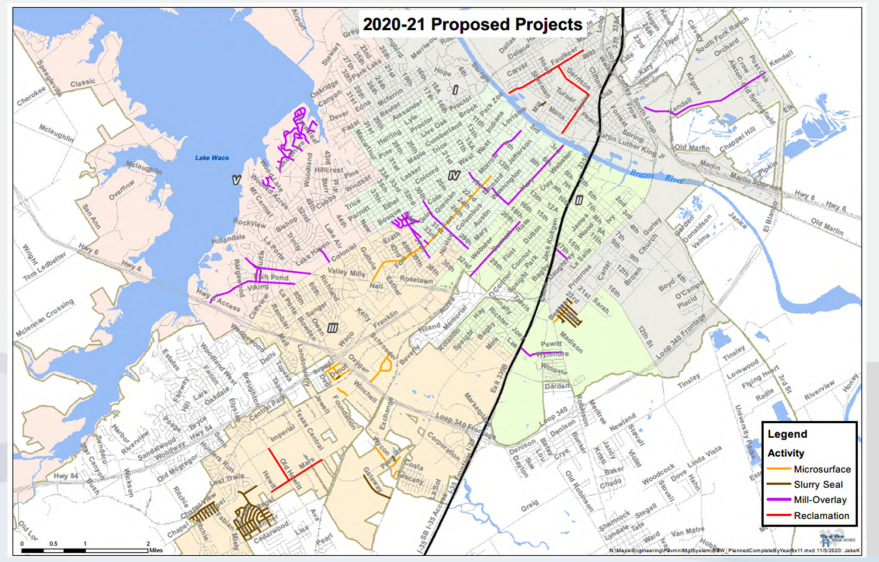
The other critical part of the CIP is how all these projects are to be funded. A substantial part of the costs listed above are planned to be covered by the issuance of new debt (approximately 71%). The City staff is aiming to issue this debt in early 2021 (how the City issues debt is an interesting topic for a different time).
One last interesting take away from the proposed CIP is the chart below. It references a measure called PCI. This stands for pavement condition index. In short this is a metric for measuring the quality of streets. It runs from 0 to 100. This chart compares spending on various kinds of roadwork to their PCI impact. Overall, the anticipated PCI change is 1.43 (including the natural decay of the existing inventory). This would move Waco from 49.3 to 50.73 (an improvement of 3%).
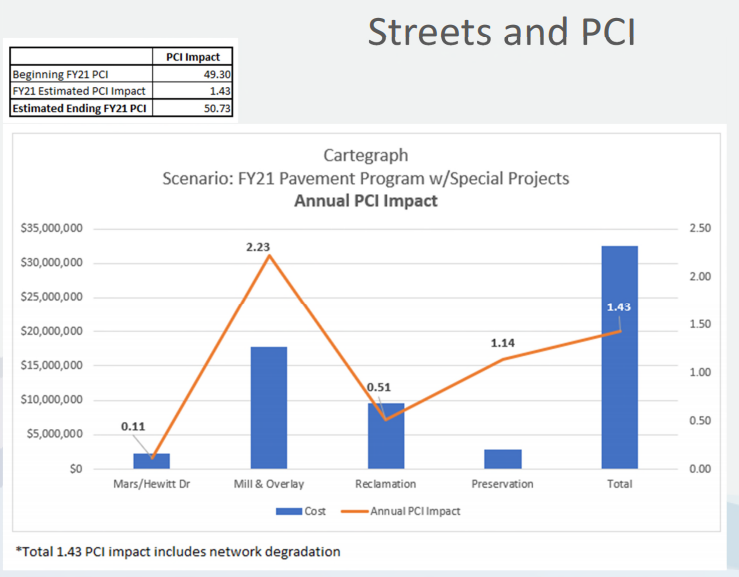
What comes next?
- December 15th – City Council plans to approve resolution related to the issuance of debt for capital projects
- February 2nd – City Council plans to approve final CIP
Meeting Basics
- Budget & Audit Committee Regular meeting – Tuesday, November 10, 2020, 1:30 pm
- To watch the recorded session click here (City of Waco Cable Channel on YouTube)
- For the full agenda click here
- For the meeting packet with the documents pertinent to the meeting click here.

Jeffrey Vitarius has been actively local since early 2017. He lives in Sanger Heights with partner (JD) and his son (Callahan). He helped found Waco Pride Network and spearheaded its Vision 2025 process. Jeffrey works at City Center Waco where he helps keep Downtown Waco clean, safe, and vibrant. He is a member of St. Alban’s Episcopal Church and graduated from Baylor in 2011.
The Act Locally Waco blog publishes posts with a connection to these aspirations for Waco. If you are interested in writing for the Act Locally Waco Blog, please email [email protected]for more information.
